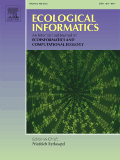
Ecological Informatics
metrics 2024
Transforming ecological data into actionable knowledge.
Introduction
Ecological Informatics is a premier journal published by Elsevier, dedicated to advancing the interdisciplinary fields of ecology and informatics since its inception in 2006. With its ISSN 1574-9541 and E-ISSN 1878-0512, this Netherlands-based journal has established itself as a leading platform for high-quality research, reflected in its impressive Q1 rankings across multiple categories including Applied Mathematics, Computational Theory, Ecology, and Ecological Modeling, showcasing its critical role in shaping scientific discourse in these important domains. The journal ranks in the top percentiles for various fields: for instance, it stands at rank #26/635 in Applied Mathematics and #8/41 in Ecological Modeling according to Scopus. Though it currently does not offer open access options, its commitment to publishing impactful studies underscores its significance to researchers, professionals, and students interested in ecological and computational methodologies. Researchers in these fields are encouraged to explore and contribute to this respected journal as it continues to inspire innovative solutions for ecological challenges.
Metrics 2024
 1.10
1.10 5.80
5.80 5.60
5.60 77
77Metrics History
Rank 2024
Scopus
IF (Web Of Science)
JCI (Web Of Science)
Quartile History
Similar Journals

WEB ECOLOGY
Fostering Dialogue on the Ecology of the InternetWEB ECOLOGY is a premier academic journal published by COPERNICUS GESELLSCHAFT MBH, specializing in the field of Ecology, with a specific emphasis on the intricate interrelations between web-based ecosystems and environmental factors. Since its inception in 2000, this Open Access journal has provided an invaluable platform for researchers, professionals, and students to disseminate and access cutting-edge research findings. Currently based in Germany, WEB ECOLOGY has garnered a significant reputation, evidenced by its prestigious Q2 quartile ranking in both Ecology and Ecology, Evolution, Behavior and Systematics as of 2023. Furthermore, its impressive Scopus rankings, placing it within the top quartiles of its categories, highlight its relevance and influence in the field. With comprehensive coverage from 2000 to 2024, the journal aims to foster dialogue and innovation in ecological research, making significant contributions to our understanding of web ecology and inviting submissions that push the boundaries of current knowledge.
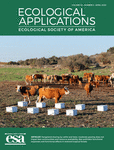
ECOLOGICAL APPLICATIONS
Innovative insights driving ecological management.ECOLOGICAL APPLICATIONS, published by WILEY, is a leading journal in the field of ecology, providing a platform for innovative research that addresses the understanding and management of ecological systems. With an ISSN of 1051-0761 and E-ISSN of 1939-5582, it has established itself as a vital resource for ecologists and environmental scientists since its inception in 1991. Ranked in the top quartile (Q1) for Ecology in 2023 and with a Scopus ranking of 40 out of 461 in Environmental Science, ECOLOGICAL APPLICATIONS boasts an impressive impact factor, attesting to its significance and influence in the field. The journal's mission is to publish peer-reviewed articles that contribute to ecological theory and its applications in conservation and environmental management. Researchers, professionals, and students alike will find invaluable insights and the latest developments in ecological research through its comprehensive scope and rigorous scholarship, ensuring a crucial role in shaping future ecological practices and policies.
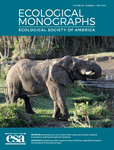
ECOLOGICAL MONOGRAPHS
Pioneering comprehensive studies in ecology and systematics.ECOLOGICAL MONOGRAPHS, published by WILEY, stands as a premier journal in the field of ecology, evolution, behavior, and systematics, with an impressive impact factor and ranking in the 96th percentile among its peers. Since its inception in 1974, this journal has offered comprehensive insights and advanced knowledge on ecological phenomena, serving as a vital resource for researchers, professionals, and students alike. With its commitment to publishing high-quality, peer-reviewed articles, it operates within the esteemed Q1 category of ecology, solidifying its reputation as a leading platform for innovative research. Though not available as open access, ECOLOGICAL MONOGRAPHS ensures broad reach and visibility through its rigorous editorial standards and substantial scholarly contributions. As it continues to aggregate vital ecological data and synthesize research across multiple converged years, this journal remains invaluable for those dedicated to understanding complex ecological interactions and their implications for environmental policy and management.

Nature Conservation Research
Championing open access to vital conservation insights.Nature Conservation Research is a prominent open-access journal that has been dedicated to advancing the field of conservation science since its inception in 2016. Published by the SARANSK FOND PODDERZKI & RAZVITIA ZAPOVEDNYH in the Russian Federation, this journal serves as a vital platform for researchers, professionals, and students alike, providing critical insights into ecological and environmental issues. With an impressive impact factor and ranked in the second quartile across multiple categories—including Agricultural and Biological Sciences, Earth and Planetary Sciences, Ecology, and Nature and Landscape Conservation—Nature Conservation Research stands at the forefront of impactful scientific discourse. The journal not only aims to disseminate high-quality research findings but also seeks to foster collaboration and innovation in conservation practices globally. By ensuring open access to its content, it promotes widespread dissemination of knowledge, crucial in the fight against biodiversity loss and environmental degradation. Researchers and practitioners contributing to the journal will find themselves at the convergence of science and conservation efforts, paving the way for sustainable ecosystem management.

ECOGRAPHY
Connecting Scholars to Shape Ecological FuturesECOGRAPHY, published by WILEY, stands at the forefront of ecological and evolutionary research, with an impressive Impact Factor reflecting its esteemed position in the Q1 category of Ecology, Evolution, Behavior, and Systematics. Operating since 1978 and transitioning to a fully Open Access model in 2020, the journal is dedicated to disseminating high-quality research that influences conservation practices and enhances our understanding of ecological dynamics. With an ISSN of 0906-7590 and an E-ISSN of 1600-0587, ECOGRAPHY has garnered a remarkable placement in Scopus rankings, being in the top 4% of its category, achieving an impressive rank of #27 out of 721 in Agricultural and Biological Sciences. Academics from around the globe benefit from the research published in this journal, which seeks to engage and inspire further exploration of ecological systems. For inquiries, ECOGRAPHY can be reached at their UK address: 111 River St, Hoboken 07030-5774, NJ.

Diversity-Basel
Shaping the future of biodiversity conservation through cutting-edge research.Diversity-Basel is a premier open-access journal published by MDPI, specializing in the vital fields of agricultural, biological, and ecological sciences. Launched in 2009, this multidisciplinary journal, operating from Switzerland, aims to disseminate high-quality research that advances the understanding of biodiversity and ecosystem dynamics. With an impressive impact factor and notable rankings in Scopus, including Q1 classification in Agricultural and Biological Sciences and strong positions in Ecology and Ecological Modeling, Diversity-Basel stands as a valuable resource for global researchers, professionals, and students alike. Its commitment to accessibility enables researchers to reach a wider audience, fostering collaboration and innovation in addressing pressing environmental challenges. By providing an inclusive platform for diverse scientific inquiries and innovations, Diversity-Basel plays an essential role in shaping the discourse on biodiversity conservation and management, encouraging the pursuit of sustainable solutions in our rapidly changing world.

PHYTOCOENOLOGIA
Cultivating Understanding of Plant CommunitiesPHYTOCOENOLOGIA, published by GEBRUDER BORNTRAEGER, is a prominent journal in the field of Plant Science, holding a prestigious position in the academic landscape with a 2023 Scopus rank of #235 out of 516 in its category, reflecting its contributions to agricultural and biological sciences. Since its inception in 1987, the journal has provided a vital platform for researchers, offering insights and disseminating advances in phytoecology and related disciplines. With its strong commitment to quality, PHYTOCOENOLOGIA is classified in the Q3 quartile, making it a valuable resource for professionals and students alike. The journal welcomes diverse research articles, reviews, and case studies that enhance our understanding of plant communities and their ecological dynamics. Although it operates under a traditional access model, it continues to foster a collaborative environment for scholars eager to explore critical issues in plant science.
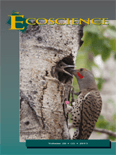
ECOSCIENCE
Advancing ecological knowledge for a sustainable future.ECOSCIENCE, published by Taylor & Francis Inc, stands as a prominent journal in the fields of Ecology and Environmental Science, recognized for its commitment to advancing knowledge since its inception in 1994. With an ISSN of 1195-6860 and an E-ISSN of 2376-7626, the journal caters to a diverse audience of researchers, professionals, and students passionate about ecological and environmental issues. In 2023, it achieved Q2 and Q3 rankings in the Scopus category of Ecology and Evolution, Behavior and Systematics, reflecting its significance within the academic community. Moreover, ECOSCIENCE occupies notable positions in Scopus rankings, including Rank #324 in Agricultural and Biological Sciences and Rank #210 in Environmental Science, symbolizing its role as a catalyst for disseminating high-quality research. Although currently not open access, the journal's multifaceted scope encourages in-depth discussions on ecological diversity, conservation strategies, and sustainable practices, making it an invaluable resource for those engaged in ecological research and practice.
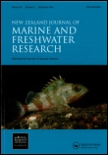
NEW ZEALAND JOURNAL OF MARINE AND FRESHWATER RESEARCH
Advancing Knowledge in Freshwater and Marine EcosystemsNEW ZEALAND JOURNAL OF MARINE AND FRESHWATER RESEARCH, published by Taylor & Francis Ltd, stands as a distinguished platform for the dissemination of innovative research in the realms of aquatic science and ecology. With an ISSN of 0028-8330 and E-ISSN 1175-8805, this journal has been curating significant scientific contributions since its inception in 1967, continuing through to 2024. Recognized in the Q2 category across multiple relevant fields—including Aquatic Science, Ecology, and Water Science—this journal ranks notably in Scopus, with a 74th percentile for Ecology, Evolution, Behavior and Systematics, highlighting its impact and relevance within the scientific community. Though not an open-access publication, its rigorous peer-reviewed articles offer insights that resonate with researchers, professionals, and students who are passionate about advancing our understanding of freshwater and marine ecosystems. By fostering a collaborative space for ecological and environmental inquiries, the NEW ZEALAND JOURNAL OF MARINE AND FRESHWATER RESEARCH is essential for those aiming to contribute to the vital conversations around biodiversity, conservation, and sustainable management of aquatic resources.
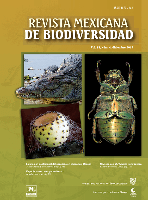
Revista Mexicana de Biodiversidad
Exploring Ecological Insights for a Sustainable FutureRevista Mexicana de Biodiversidad is a prominent academic journal dedicated to the field of biodiversity and conservation, published by the prestigious Instituto de Biología, Universidad Nacional Autónoma de México. Since its inception as an Open Access publication in 2005, it has aimed to disseminate high-quality research that advances the understanding of biological diversity in Mexico and beyond. With an ISSN of 1870-3453 and an E-ISSN of 2007-8706, the journal caters to a diverse audience, including researchers, professionals, and students, by providing vital insights into ecological studies, conservation strategies, and the sustainable management of natural resources. The journal is committed to fostering scientific collaboration and promoting the significance of biodiversity in addressing contemporary environmental challenges. By publishing innovative and impactful research, the Revista Mexicana de Biodiversidad plays an essential role in the global discourse on biodiversity conservation.